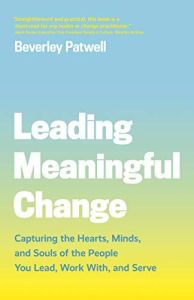Join getAbstract to access the summary!

Join getAbstract to access the summary!
Beverley Patwell
Leading Meaningful Change
Capturing the Hearts, Minds, and Souls of the People You Lead, Work With, and Serve
Figure 1 Publishing, 2020
What's inside?
Feel the power of meaningful change in your organization.
Recommendation
A growing trend in change management theory responds to the uncertain times organizations face. Beverley Patwell encourages people to embark on a “change journey.” She urges you to analyze the power dynamics at work, to be an accountable team player and to seek constant feedback as you align, integrate, carry out and renew your change process. Patwell draws on extensive research to elucidate her “Use-of-Self” philosophy, which positions the individual as the linchpin for meaningful change. While her style is dry and full of jargon, she proves supremely knowledgeable. Her approach will resonate with leaders adapting to new workplace challenges.
Summary
About the Author
Beverley Patwell is a professor at the University of Notre Dame, Queen’s University and Concordia University, and co-authored Triple Impact Coaching: Use-of-Self in the Coaching Process with Edith Whitfield Seashore.

















Comment on this summary